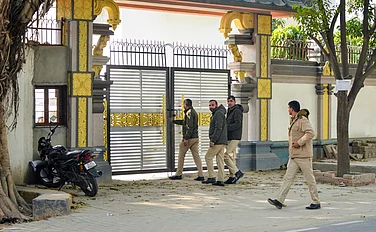Minister of State in Prime Minister Office, Dr Jitendra Singh, on Thursday said the economy is too serious a subject to be left to economists alone. “So we have Prime Minister who also oversees”, he said in Srinagar, during the opening ceremony of Mudra Protsahan Abhiyaan on the banks of Dal Lake.
The campaign is going to be held at 50 locations across the country.
Singh said that the Government of India under the leadership of Prime Minister Narendra Modi is committed to strengthening the small-scale industries across the country and has given free hand to economists.
“Our government has got the political will and resolve to initiate bold reforms to streamline the economy and we have done so in the form of GST and demonetisation,” he said.
He said the central government has focused on to generate employability rather than employment. “This has inspired schemes like Mudra. Ours is a political dispensation that has encouraged economists to have a free hand. But Mark Twain once said the economy is too serious a subject to be left to economists alone. So we have Prime Minister who also oversees.”
Singh said the current government was dedicated to poor and poorest of poor of the country.
“When you look back at the past three years of Modi government, the commitment of team Modi stands vindicated. One after the other, Jan Dhan, Mudra, GST, demonetarization, whatever steps were taken, the focus was poor and to change a lot of poorest of poor”, he said.
“If you look back at the report card of three years, this government has lived up to it and Mudra is one of the most distinct evidence of this vindication of three years of our commitment to the poor of the country, to the unemployed of this country, more so to the youth of this country”, the minister said.
Earlier Finance Minister of Jammu and Kashmir Haseeb Drabu had said most of the young entrepreneurs failed not because of the bad business model. He said they failed because social and domestic compulsions are very large.
He explained that there are 26 million small enterprises in India. "These enterprises generate 45 percent of manufacture output of India. They generate 40 percent of exports of India and they employ 60 million people. If these 26 million enterprises contribute to 45 percent of the manufacturing output, they should get 45 percent credit. If not 45 percent, they should get 40 percent, if not 40 they should get 20 percent, they get eight percent. Why ? That is the core issue”, he said, indicting the banks for “failing the small enterprises.”
He said Mudra was an indictment of the lazy banking prevalent in the country.
“Their (small enterprises) credit to GDP ratio is less than three percent. That is where the problem is. Therefore they are doomed to go into trouble. Mudra scheme doesn’t do what earlier schemes would do”, he said. He said the new thing that is making Mudra success is that it is not subsidized and is not free.
Drabu said the scheme uses the current banking infrastructure, trying to leverage the banking infrastructure and leverage the technology and these two elements will not burden either the banks or governments.
"Yet it will generate enough traction in the system to support viable enterprises and create a certain culture of entrepreneurship. Once there is access to credit, next thing will be the availability of credit and third thing will be the pricing of the credit. What Mudra seeks to do is to access to the credit," he said.
“Honesty there was no need of Mudra had banking sector worked well. Effectively what Mudra addresses or seeks to address is credit imperfection in the economy and very lazy banking that has been done by the banks”, Drabu explained.
“The most profitable lending are small loans”, he said and asked the banks to realize that schemes like Mudra or micro-finance are effectively trying to cover up for banking inefficiency and their lack of functioning properly.
He asked the banks to do some introspection and see where they have failed and think what they could have done to transfer the economy.


























